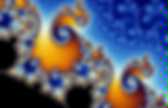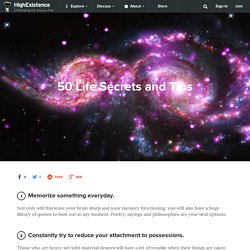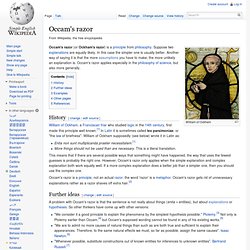

50 Life Secrets and Tips. Memorize something everyday.Not only will this leave your brain sharp and your memory functioning, you will also have a huge library of quotes to bust out at any moment.

Poetry, sayings and philosophies are your best options.Constantly try to reduce your attachment to possessions.Those who are heavy-set with material desires will have a lot of trouble when their things are taken away from them or lost. Possessions do end up owning you, not the other way around. Become a person of minimal needs and you will be much more content.Develop an endless curiosity about this world.Become an explorer and view the world as your jungle.
Stop and observe all of the little things as completely unique events. Try new things. Read “Zen and the Art of Happiness” by Chris Prentiss.This book will give you the knowledge and instruction to be happy at all times regardless of the circumstances. 10 Reasons Why Having Sex Is Good For Your Health ? Paulo Coelho's Blog. 2 Law of Attraction on Global One TV. Is the Universe a Holographic Reality? The Universe as a Hologram by Michael Talbot Does Objective Reality Exist, or is the Universe a Phantasm?

In 1982 a remarkable event took place. At the University of Paris a research team led by physicist Alain Aspect performed what may turn out to be one of the most important experiments of the 20th century. You did not hear about it on the evening news. In fact, unless you are in the habit of reading scientific journals you probably have never even heard Aspect's name, though there are some who believe his discovery may change the face of science. Aspect and his team discovered that under certain circumstances subatomic particles such as electrons are able to instantaneously communicate with each other regardless of the distance separating them.
University of London physicist David Bohm, for example, believes Aspect's findings imply that objective reality does not exist, that despite its apparent solidity the universe is at heart a phantasm, a gigantic and splendidly detailed hologram. The World As I See It. "How strange is the lot of us mortals!

Each of us is here for a brief sojourn; for what purpose he knows not, though he sometimes thinks he senses it. But without deeper reflection one knows from daily life that one exists for other people -- first of all for those upon whose smiles and well-being our own happiness is wholly dependent, and then for the many, unknown to us, to whose destinies we are bound by the ties of sympathy. A hundred times every day I remind myself that my inner and outer life are based on the labors of other men, living and dead, and that I must exert myself in order to give in the same measure as I have received and am still receiving... "I have never looked upon ease and happiness as ends in themselves -- this critical basis I call the ideal of a pigsty. The ideals that have lighted my way, and time after time have given me new courage to face life cheerfully, have been Kindness, Beauty, and Truth.
"My political ideal is democracy. A?. List of unsolved problems in philosophy. This is a list of some of the major unsolved problems in philosophy.

Clearly, unsolved philosophical problems exist in the lay sense (e.g. "What is the meaning of life? ", "Where did we come from? ", "What is reality? ", etc.). Aesthetics[edit] Essentialism[edit] In art, essentialism is the idea that each medium has its own particular strengths and weaknesses, contingent on its mode of communication. Art objects[edit] This problem originally arose from the practice rather than theory of art. While it is easy to dismiss these assertions, further investigation[who?] Epistemology[edit] Epistemological problems are concerned with the nature, scope and limitations of knowledge. Gettier problem[edit] In 1963, however, Edmund Gettier published an article in the periodical Analysis entitled "Is Justified True Belief Knowledge?
" In response to Gettier's article, numerous philosophers have offered modified criteria for "knowledge. " Occams razor. William of Ockham Occam's razor (or Ockham's razor) is a principle from philosophy.

Suppose two explanations are equally likely. In this case the simpler one is usually better. The Riddle of Epicurus or Epicurean paradox is the earliest known description of the Problem of evil, and is a famous argument against the existence of an all-powerful and providential God or gods. As translated by David Hume in the Dialogues concerning N.
In about 300 B.C., Epicurus eloquently summed up the problem of the existence of evil.

It has come to be known as the Riddle of Epicurus or the Epicurean paradox. It was translated by David Hume in the Dialogues concerning Natural Religion: 11 Things that Fill Me with Awe. Eleven Things that Fill Me with Awe The unimaginable vastness of what exists. Our visible universe has about ten billion galaxies, and those galaxies have an average of about ten billion stars each. But according to theories gaining support from reputable cosmologists, this looks like just a vanishingly small fraction of what exists. If Andrei Linde is correct, the visible universe is just a tiny bubble within our overall universe, and it's even possible that subregions of inflating bubbles could themselves inflate, ad infinitum.
If M Theory is correct, our universe has 10 spatial dimensions and our visible universe might be just a 3-D membrane in this meta-space. That the properties of the universe are conducive (perhaps even almost optimally conducive) to life. Ken Robinson says schools kill creativity.